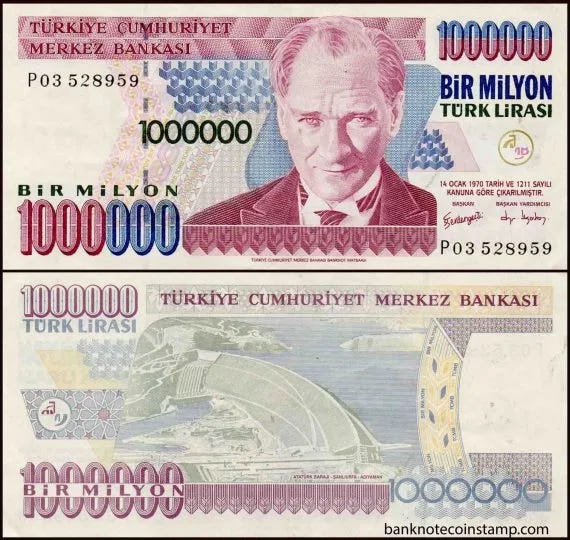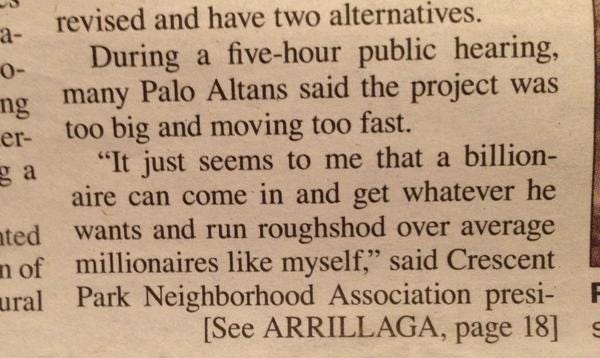Are billionaires bad?
Does Betteridge's law of headlines apply to subjects lines?
Hi. Can here So…billionaires.
I made my first million by my early teens. Admittedly, it had more to do with the fact that I lived in Turkey at the time, and thanks to decades of sky-high inflation, practically everyone was a millionaire, but still, it was neat. The Lira was devalued so much that people stopped talking in Liras, but spoke in literal millions. A can of soda was around a quarter of a million. I spent easily more than a billion building my first PC.
It didn’t even occur to me for many years I was speaking in millions, and how wild that was. Million was the real name of the currency, and Lira just a regulatory formality. Since I left Turkey, the currency is revalued, and six zeros are removed from it, so people reverted to calling the money by its proper name, but even to this day, I still think in millions (or milyon in Turkish) when I talk about the Turkish Lira.

So, for me, A million Turkish Liras is now barely one-seventh of a dollar. Even having a billion of it is not a big deal. But I live in the US now. And having a million dollars is a big deal, and having a billion is a much bigger one. Living in San Francisco, where it sometimes feels like everyone [1] is a multimillionaire who has multiple billionaire friends, it’s easy to forget how obscene of a number a billion dollars is. Being a millionaire doesn’t have the same oomph to it anymore, but a billion is still...a lot of money.
The core defining feature of our economic times is the stark wealth inequality between the incredibly rich and the rest.

Millionaires are fine, as long as they aren’t living in Palo Alto. But the billionaires, not the 1% but 1% of the 1% is so, so rich that it is hard to wrap your head around. Most people, even many of the billionaires themselves, find this somewhat concerning. Being the reasonable people they are, many 3-comma-club members argue that such unequal concentration of wealth (and income) is incompatible with a functioning liberal democracy, where power is spread across to many people, not just held by a lucky few.
I don’t think any billionaire thinks that billionaires are a policy failure. And, for the record, neither do I. In our economic and political systems, we are supposed to be OK with some unequal distribution of income. The idea is not that some people deserve to be rich while others are forever doomed to lead lives of poverty. But more that some people really like money, and they should be able to earn more by working harder (and ideally to a lesser degree, being lucky) and others should be able to live more modest, but maybe less stressful lives. [2]
One idea, I am, however, not OK with is this recent valorization of billionaires, especially in the After Corona times that we now live in.
At best, it strikes me as unbecoming to be this fascinated by someone else’s money. I am not the least materialistic person I know: I own fancy clothes, and a not-insignificant part of my net worth is in Apple products. Yet, I still find glorifying material goods, and especially money itself, very kitsch and uncool.
At worst, however, I worry about the kind of society we would be living in if we ended up relinquishing more and more of our decision making to a powerful few. I think it would suck.
At first glance, that sounds naive. After all, most of the billionaires that capture the public’s imagination like Bill Gates, Jeff Bezos, and even Mark Zuckerberg all seem like the good guys. They can be a bit awkward at times, and maybe I wouldn’t agree with them on politics, but I don’t think they are evil in a way certain Facebook board member is. Marc Benioff is straight up lovable.
The more conventional, non-tech billionaires are more fun. Warren Buffet exudes a folksy charm and quips investment koans for fintweeters. Ray Dalio has become an affable LinkedIn influencer, and Oprah, while a horrible promoter of pseudoscience, is synonymous with wholesomeness. Marc Cuban straddles a fine line between a reality-TV blowhard and a rich-and-bored sports club owner, but is overall quite entertaining.
The question, thought is, are these really the people we want to be making the calls on our future?
People love to harp on the unintended consequences of government regulation. That is fair, as many governments are insulated from accountability, and there are few repeated games. But what about the unintended consequences of billionaire activism? Are we in a better place if we atrophy as a society our ability to provide for the underprivileged? What kind of dependencies, both explicit and implicit, are we forging when we build institutions that can only fund themselves by throwing fundraisers and arm-twisting?
Diversification is not just a good idea financially, but it also allows one to be self-sufficient and robust. We are now just learning the risks we’ve all accrued over the years building a supply chain that relies on a few routes. We might end up regretting not learning another lesson later if we allow a small number of contributors crowd out the larger, more spread out tax bases and the accountability and the spirit of the union that comes with it.
Even a more fundamental question pops in my head every time I see someone a tweet, praising the promise of a kind act. Why do we rush to judge the billionaire class by the intent of their tweets versus the results of their actions? We already know that people can inflict significant damage while intending the opposite. But we also know that most the billionaires in the US are extremely fiscally conservative, and their push to get more fiscal conservatives in power end up as both socially and socially conservative policies pushed on the rest of us.
But besides, why do we rush to congratulate someone when they’ve not just promised the same a while ago and haven’t seem to have delivered? The simplistic answer is that the ultra-rich philanthropists are a social breed as any other and one’s good act can inspire the other. Yet, I think we can save the praises when the benefits have been delivered, not when the tweets have been delivered. This is not a provocative idea. People love to talk about being results-driven, versus aspiration oriented. Why not apply that same rubric to the billionaires as well?
And more importantly, for every margin-eviscerating, pitting-cities-against-each-other but also buying-newspapers and donating-to-food-banks Bezos, there is an arts-funding but also drug-pushing Sackler out there. The more we glorify and valorize billionaires, the less scrutiny they will attract and harder it will be to hold them to account.
As we extoll the virtues of billionaire activism of those who are good, we are providing unintentional air cover for the bad. We should be skeptical of the concentration of power, which is what capital now is, not as a hobby but as part of our duty in participatory democracies we live in. This is not about eating the rich, but simply wanting to eat ourselves.
While looking at the world from the economic lens of capitalism, it is easy to convince oneself that more wealth equals more good. The argument goes: the riches one accrues is simply the surplus from the good they’ve provided to the society.
This homo-economicus view of the world is cartoonishly simple, and while allowing for beautiful charts and tweets, it looks at the world as if it exists in a vacuum. Our current society is tilted to provide more for those who have more, and it’s swinging more so each passing day. Zuckerberg deserves being the CEO of Facebook, but how many kids in his position had access to tens of thousands of dollars to bootstrap a company as he did? Same for Bezos. Or Gates. They say the first billion is much harder than the first million, and I believe it, but that ignores how hard the first million is in the first place. Most Americans don’t have a few hundred to weather through a minor storm. If we want to stand united, we first need to stand.
Moreover, this armchair economists’ view of wealth simply papers over how individuals look at the world not in absolute terms, but relative. People, as much as we’d like them not to, want to keep with the Joneses. While we are richer than ever, in absolute terms, we also have many more ways to compare each other with not just the people immediately around us, but those of us that have moved to greener pastures. Growing the pie matters, but less so if some are increasingly getting a larger piece.
The liberal democratic system is built on the idea that we should spread accountability and power, not just because the bad might take the reins one day, and we should limit their damage, but also that we can’t trust anyone good to be in charge either. The vacuous praises. Take it from me. I was a billionaire once.
PS: As I was editing this piece, Grammarly came up with this suggestion. There are entire books to be written about the implicit biases in machine learning algorithms, how conservative they can be by design, but this was almost too on the nose. Are Grammarly’s algorithms built on Ayn Rand novels? Is this what subedited feels like? Should I be worried?

Note 1: I recognize this speaks more to my homogenous circle.
Note 2: Unequal distribution of wealth is a bit trickier to explain. People like Piketty argue that a big reason behind the wealth inequality is that earnings of the capital grew faster than the growth of the economy. As a non-economist, I find that idea convincing and I am partial to interventionist solutions to that.


One million seconds is 11.5 days. A billion seconds is 31.7 years.